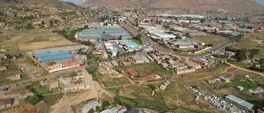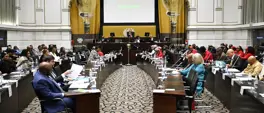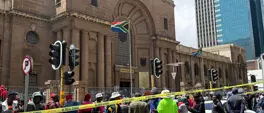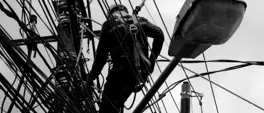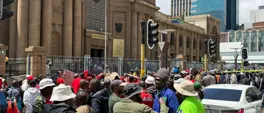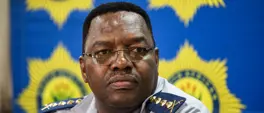MALAIKA MAHLATSI: How the DA's opportunism nearly destroyed a brilliant black water scientist
Malaika Mahlatsi
25 October 2024 | 18:28The DA's Solly Msimanga sought to debilitate Rand Water's group chief executive, Sipho Mosai, writes Mahlatsi.
In September 2023, the leader of the Democratic Alliance (DA) in Gauteng, Solly Msimanga, who had previously served as the Mayor of the City of Tshwane before his humiliating removal, launched a vicious attack on the water utility, Rand Water, and its Group Chief Executive, Sipho Mosai.
Msimanga, emboldened by the attention the issue of water insecurity in the province, was receiving from a media that has a very limited understanding of water governance and legislation, went on a rampage accusing Mosai of being incompetent and Rand Water of being ineffective.
This argument was based on the misinformed assumption that Rand Water was responsible for the provision of water to households in the province.
In reality, the utility sells water to municipalities, who are tasked by legislation to ensure its provision to households. At the time, many suburbs in Gauteng were experiencing water shortages, much like what has been happening over the past few months.
Msimanga went so far as to call for the removal of Mosai, arguing that the man, a water scientist with over 20 years of experience in the water sector and numerous postgraduate qualifications in water sciences and management, was not fit for the task of leading the biggest water utility in South Africa.
Before being appointed as the Group Chief Executive of Rand Water, Mosai had been the organisation’s Chief Operations Officer for a decade. He had worked in various institutions including the City of Cape Town, Mhlathuze Water, the national Department of Water and Sanitation as well as higher learning institutions including the University of Zululand.
The attacks on Mosai continued despite numerous water experts and academics challenging the narrative of Rand Water being responsible for chronic water shortages in Gauteng. Msimanga was unable or unwilling to engage with the facts before him, and only ceased his tirade when legal action was brought against him.
This week, the Minister of Water and Sanitation, Pemmy Majodina, opened a virtual briefing before the Portfolio Committee of Water and Sanitation in a meeting that was called in response to the deteriorating water situation in Gauteng. Majodina stated what Rand Water had been arguing for a long time, and what Msimanga deliberately pretended to not understand: that water overuse and municipal non-revenue issues are the cause of the water crisis in the province.
Majodina went further to state that Rand Water, contrary to Msimanga’s arguments of its incompetence, was, extracting the right amount of water to supply the province adequately.
Majodina’s sentiments were corroborated by various speakers at the recent Gauteng Local Government Turnaround Strategy Summit held in Muldersdrift. Speaking at the opening of the summit, Gauteng premier, Panyaza Lesufi, stated that deteriorating water infrastructure is at the heart of the province’s water crisis.
He went on to declare war on leaks, arguing that unless water leaks were repaired, there would be a bleak Christmas in the province. Gauteng MEC for Cooperative Governance and Traditional Affairs (COGTA) Jacob Mamabolo also echoed the same sentiments, demanding that the Mogale City Local Municipality must repair wastewater treatment plants whose damage was causing raw sewage to spill into rivers and residential areas.
Mamabolo stated frankly that the municipality was failing at its responsibility to ensure the provision of safe drinking water, saying: “What’s concerning is that there is no plan to stop the leak and make sure that it is contained”. He gave the municipality two days to stop the flow of the raw sewage and to fix the damaged infrastructure.
With the truth about the cause of the water crisis in Gauteng being laid bare, and the responsibility being laid at the feet of municipalities, the DA in Gauteng and its leader are conspicuously silent. They have not issued any statements to correct the damaging lies that had been at the heart of the campaign to remove Mosai and position Rand Water as the cause of the water challenges in Gauteng.
This is deeply problematic because what the party had done could have resulted in the removal of a man who has turned around Rand Water and made it into one of the best-performing entities of our government. But the issue is bigger than Mosai – it is an issue of how Black professionals are constantly being used as scapegoats.
Those who lead such campaigns get away with it because they have allies in our liberal media that have cemented the racist and colonial idea that Black professionals are inherently incompetent and corrupt. Msimanga said as much, stating that Mosai was a political deployee, a term that has been vulgarised and made to synonymise corruption, nepotism and ineptitude.
Gauteng is facing one of the biggest challenges it has ever faced and we need leaders with integrity to help us out of it. We don’t need people who use the crisis for political mileage and relevance. Unless there is political will to resolve the water crisis in a province that serves as the nerve centre of the South African economy, a crisis born out of poor governance and lack of consequence management on the part of municipalities, we are going to find ourselves facing more than just a bleak Christmas.
And now, as Rand Water, the national and provincial government and other stakeholders work hard to prevent the crisis from becoming a catastrophe, the likes of Msimanga must reflect very seriously on how they are part of the problem.
And while doing so, he must also have the humility to publicly acknowledge that he was wrong about the cause of the province’s water woes – and to apologise not only to Mosai, but to all the hardworking professionals at Rand Water who were made to appear incompetent when in fact, they were the ones doing everything possible to stabilise water supply under the most difficult circumstances that include non-payment by municipalities.
We must demand an end to the slaughter of competent Black professionals at the altar of political expediency – and it must start with holding reckless leaders like Msimanga accountable.
Malaika is a geographer and researcher at the Institute for Pan African Thought and Conversation. She holds a MSc in Water Resource Science and is a PhD in Geography candidate at the University of Bayreuth in Germany.
Get the whole picture 💡
Take a look at the topic timeline for all related articles.
Trending News
More in Opinion

31 October 2025 14:15
MALAIKA MAHLATSI: The dangers of the middle-class and the wealthy opting out of government services
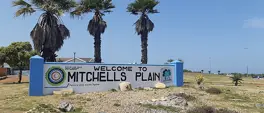
31 October 2025 10:43
ANTHONY HAZELL | Cape Town is actively unstitching apartheid’s spatial legacy
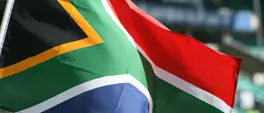
31 October 2025 04:15
MANDY WIENER | Madlanga, exiting grey list shows we are turning the corner
